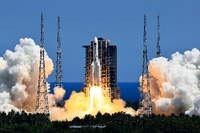A Chinese rocket entered Earth’s atmosphere from space on Saturday. This was announced by the US Forces Space Command on Twitter on Saturday. At 18:45 German time she was over the Indian Ocean. The US agency did not provide more details.
Experts expected debris from the rocket to hit Earth from space. Aerospace Corporation’s Center for Reentry Studies (CORDS) in California had forecast the Long March 5B rocket’s reentry between mid-afternoon and late evening Saturday.
According to “Welt”, experts had estimated the start of the debris rain at 6:16 p.m., “somewhere between Japan and California”. According to experts, however, the probability that people or populated areas will be hit is extremely low.
Nevertheless, there was criticism from NASA. “The People’s Republic of China has not shared any specific trajectory information,” said NASA chief Bill Nelson. However, this type of information exchange is “crucial for the responsible use of space and the safety of people here on earth”.
The trajectory of the 33 meter long and 20 ton upper rocket stage had previously been observed with concern by space experts. China had received criticism from NASA for the fact that the rocket did not break up into smaller parts when it entered the atmosphere, as is the international standard.
The country launched the second module for its Tiangong (Heaven’s Palace) space station, which is currently under construction, with a laboratory on board last Sunday. The Long March 5B rocket placed the module in orbit within minutes.
Chinese missile not the first time poses problems
China’s space agency spoke of a “complete success” after the start. The new module will dock with the Tianhe core module, which was launched in April 2021.
According to this, in May 2021, the remains of a rocket used for this purpose fell into the Indian Ocean near the Maldives archipelago. According to China’s space program, “most of it” was burned up and destroyed when it re-entered the Earth’s atmosphere. Even then there was criticism from NASA.
Space nations must minimize the dangers to people and property on Earth from the re-entry of space objects and demonstrate the greatest possible openness to such operations, Nasa boss Bill Nelson said. (dpa)
